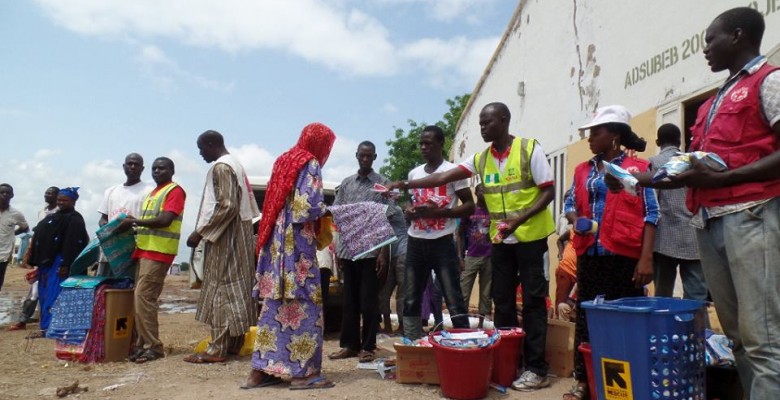In the past two weeks, cholera has been ravaging Internally Displaced Persons camps (IDPs) in Borno State. A United Nations report said Borno recorded 530 cases with about 23 deaths. The UN Office for the Coordination of Humanitarian Affairs (OCHA) said the first case was recorded on August 16, 2017.
The OCHA had said, “Over 530 suspected cases had been registered as of Sept. 5, 2017, including 23 deaths (4.3 per cent fatality rate). The outbreak is mainly in Muna Garage, a camp hosting at least 20,000 internally displaced persons on the outskirts of the state capital, Maiduguri. Other cases were identified in Custom House, Ruwan Zafi and Bolori II, all camps located near Muna Garage. There have also been reports of a suspected cholera outbreak in Monguno and Dikwa Local Government Areas.”
Experts attributed the outbreak of the epidemic to several days of incessant heavy downpour that caused flood at the camps. They flayed the gross inadequacy in the provision of sanitary items to the IDPs, according to the law establishing camps globally, noting that the breach of standards by officials and agencies concerned has contributed immensely to creating the squalid conditions in most of the camps.

We commend the United Nations for the report and all its efforts in tackling the disease. We also commend the state government and other development partners on their roles in making life easier for victims of insurgency in Borno State. However, we urge that more efforts should be made to improve the sanitary condition in the camps and ensure that displaced persons have access to potable water. Government should also move towards clearing all the drainages. Furthermore, the people should be sensitised on the need to keep drainages clean and to stop throwing dirt into them. They should also be warned on the dangers of open defecation.
Adequate medical personnel should be deployed to all the camps to manage the disease and ensure that the number of deaths is reduced to the barest minimum. Relevant authourities should also ensure that necessary drugs are made available. Aside that, the process of returning displaced persons to their homes which has already commenced, should be fast-tracked to clear the camps, because even if the camps are clean, the sheer number of people in them could lead to another disease outbreak. Crowded makeshift camps are usually at risk of contagious diseases like cholera.
This development should also serve as a wake-up call to governments across the country to take urgent steps to ensure that drainages are kept free to ensure free flow of water. Recently, there have been cases of flooding in Kogi and Benue States. The authourities in these states should take proactive steps to prevent the outbreak of cholera. The sanitary conditions of the camps which will host the newly displaced persons must be a priority.
There is also a need to entrench a culture of cleanliness and general hygiene among citizens, as such diseases thrive only in dirty environments. Adequate and qualified health personnel should be employed and empowered to embark on monitoring and to sanction anyone found wanting. They should be deployed to rural areas, where their services are most needed.
Also, some states do not have waste disposal trucks which are supposed to go around, clear waste and properly dispose them. That should be addressed immediately. Authorities should engage in massive campaigns on cleanliness and the dangers of drinking unclean water, especially in rural areas.
This should not be allowed to go the way of the meningitis outbreak, which occurred earlier in the year and claimed the lives of 1,114 Nigerians. The time to tackle the problem is now. Government at all levels should take action immediately before it escalates.

